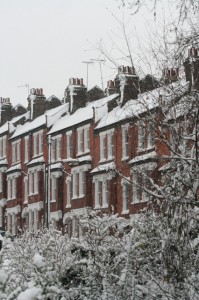Many of you will have seen the adverts for The Big Lunch. The idea is that neighbours all contribute towards a communal lunch and get together to eat it and get to know one another better.
Some of you will have recognised the location for the adverts is in the Shaftesbury Park Estate. A little detective work (well, not much because it’s fairly obvious if you know the area) reveals Milton Avenue is, in fact, Morrison Street.
Now I’m actually a bit disappointed by it. Not because I don’t think it is an absolutely splendid idea, but because they have created a fake location. They are advertising the idea of turning streets into neighbourhoods, but then disguising a real neighbourhood.
Perhaps even more disappointing is that, when you look on the Big Lunch website there are, currently, no events planned on the Shaftesbury Estate. Just two people who are interested – one of them is me, and I am almost certainly not going to be around on 19 July (otherwise my neighbours would have been getting more leaflets and knocks on the door than usual from me).
I usually will point out that assuming someone else will do something is the wrong thing – generally it is, there has to be some responsibility taken – but I can’t help but feel that maybe the organisers of the Big Lunch could have given Morrison Street a little kick start.
But having aired that little gripe, it all echoes a point I failed to make last week, when I was was pondering the sudden upsurge in street parties, they suddenly seem to be fashionable again.
When I was younger we always seemed to be having street parties, my earliest memory is from the street party we had for the Silver Jubilee in 1977. I was given a ride in a cart pulled by a donkey (which I assume was doing the rounds of the street parties) and had to be taken off half-way through because I was bawling my eyes out.
Looking back, despite my feeling that street parties were a regular occurrence, there were probably only two – the Jubilee and the wedding of Charles and Diana in 1981. But they seemed a natural and appropriate response to a national event. And I’m not quite sure why they stopped. Perhaps because there weren’t any more excuses. Perhaps because society changed. Perhaps because things like the Atari and video were taking off and people just didn’t want to meet other people anymore.
And maybe just blogging about it isn’t good enough. Maybe I should have cancelled my plans for 19 July, knocked on doors and delivered those leaflets to try and get something organised on my street. Having failed to do anything, I’m actually just as much to blame for the decline in neighbourhood spirit as anything else.
Maybe I should resolve to do better next year… Anyone with me?
As a little footnote the council issued a single traffic order for all the Big Lunch applications they had received (thereby saving on costs). There are only seven roads that will be officially closed on 19 July: Bridgeford Street SW18, Cloudesdale Road SW12, Fernside Road SW12, Galveston Road SW15, Martindale Road SW12, Salterford Road SW17, Weiss Road SW15.

 I can’t promise this will be a last word about the snow. The council is continuing to get through an astounding 500 tonnes of grit a day and is starting to move its focus onto the pavements. However, I came across
I can’t promise this will be a last word about the snow. The council is continuing to get through an astounding 500 tonnes of grit a day and is starting to move its focus onto the pavements. However, I came across 
 If not a total surprise, I was saddened to hear that Wandsworth’s local paper is no more. Even more so that it passed with no-one noticing, the issue published just before Christmas,
If not a total surprise, I was saddened to hear that Wandsworth’s local paper is no more. Even more so that it passed with no-one noticing, the issue published just before Christmas,  th There were 140 nominations for awards, which barely scrapes the surface of the amount of volunteering that takes place – apparently the volunteering ‘economy’ is worth over £20 million a year in Wandsworth, and that’s assuming a minimum wage payment to the volunteers we know about.
th There were 140 nominations for awards, which barely scrapes the surface of the amount of volunteering that takes place – apparently the volunteering ‘economy’ is worth over £20 million a year in Wandsworth, and that’s assuming a minimum wage payment to the volunteers we know about.